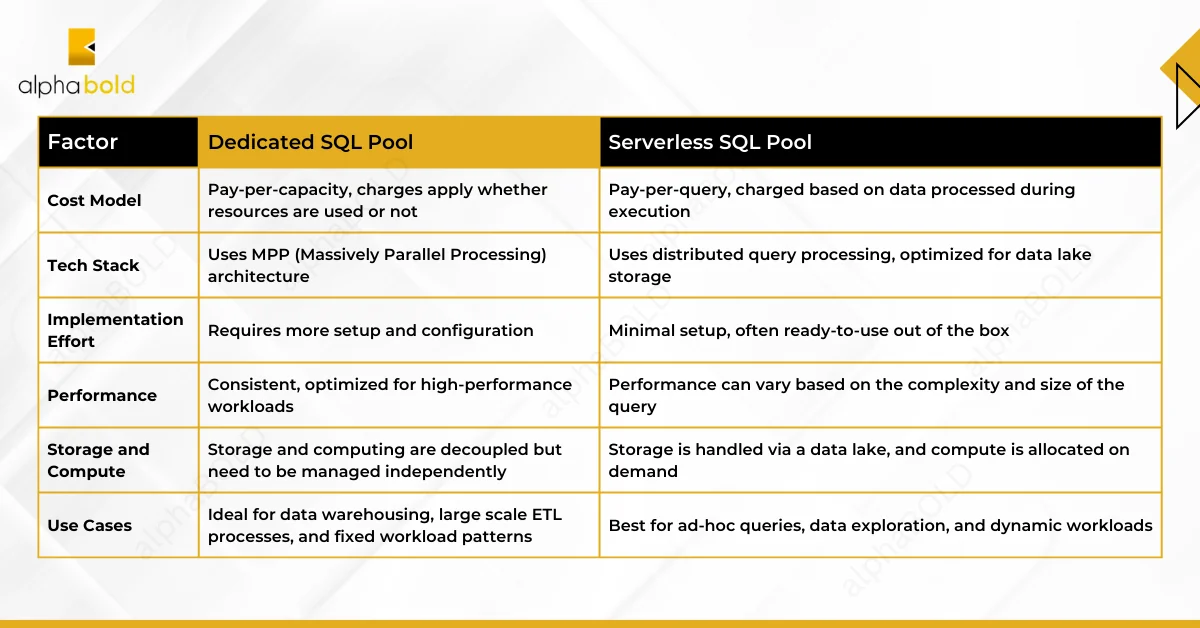Table of Contents
Introduction
Azure Synapse Analytics provides two powerful SQL-based options for data processing: Dedicated SQL Pools and Serverless SQL Pools. While both can handle extensive data warehousing needs, they are designed for different use cases and have distinct advantages. This blog will break down their definitions, dive into a detailed comparison, and explore which scenarios best suit each.
What are Dedicated SQL Pools and Serverless SQL Pools?
Dedicated SQL Pool:
A Dedicated SQL Pool (formerly known as Azure SQL Data Warehouse) in Azure Synapse Analytics is a provisioned data warehouse service. It provides a dedicated set of resources for high-performance data processing and is optimized for large-scale data workloads. With this model, you pre-allocate compute resources that remain reserved and run continuously, offering consistent performance levels.
Serverless SQL Pool:
A Serverless SQL Pool is an on-demand query service built into Azure Synapse Analytics. It allows you to query data stored in Azure Data Lake without needing dedicated resources or infrastructure. Serverless SQL uses a pay-per-query model, where you only pay for data processed, making it ideal for scenarios with unpredictable or bursty workloads.
Key Differences: Dedicated SQL Pool and Serverless SQL Pool

Explore how Azure DevOps for custom development projects can transform your software development:: Why CIOs Prefer Azure DevOps for Custom Development Projects
Cost Analysis: Which SQL Pool Is More Budget-Friendly?
The pricing models of Dedicated and Serverless SQL Pools are fundamentally different:
- Dedicated SQL Pool: The cost is predictable but often higher because you’re paying for allocated resources even when they are not in use. It’s suitable when you have a consistent data workload and require sustained performance.
- Serverless SQL Pool: This model is more cost-effective for random queries and exploration since you only pay for the data scanned by each query. It’s ideal for businesses looking to minimize costs without compromising on the flexibility to run queries on an as-needed basis.
Find Out Your Business’s Full Potential with Azure: Get a Free Consultation Today!
Ready to transform your cloud journey with the power of Microsoft Azure? Our AlphaBOLD experts are here to provide tailored solutions that meet your unique business needs. Don’t wait to optimize, scale, and secure your infrastructure—schedule your free consultation today and see how we can help you thrive in the cloud!
Request a ConsultationUse Cases: When to Choose Dedicated SQL Pool and Serverless SQL Pool
When to Use Dedicated SQL Pool:
- Large-scale ETL Processes: Dedicated SQL Pools are excellent for performing Extract, Transform, and Load (ETL) operations that require heavy data processing.
- Data Warehousing: If your business relies on structured data with consistent analysis, the predictable performance of a Dedicated SQL Pool is advantageous.
- Operational Reporting: When you need high-speed operational reporting with minimal latency, the dedicated resources help deliver reliable results.
When to Use Serverless SQL Pool:
- Ad-hoc Queries: Serverless SQL Pool offers a more cost-efficient solution if you perform infrequent or unpredictable data queries.
- Data Exploration: When exploring data in a data lake to understand patterns or trends, serverless options make it easy to access data without needing pre-defined schemas.
- Data Lake Integration: Since Serverless SQL Pools are designed to work directly with data stored in Azure Data Lake, they are perfect for use cases requiring seamless data exploration and analytics.
Are you a growing organization looking for safe and secure options? Read: Streamlining Microsoft Azure Identity and Security for Growth
Migrating from Dedicated SQL Pool to Serverless SQL Pool (and vice versa)
Migration between Dedicated SQL Pools and Serverless SQL Pools is possible, though it requires careful planning. Here are a few considerations:
- From Dedicated to Serverless: If you want to switch to a serverless model to reduce costs, you must restructure your queries to optimize them for data lake operations. Serverless SQL Pool may not support all T-SQL features, so adjustments to the code might be necessary.
- From Serverless to Dedicated: Moving from Serverless SQL to Dedicated SQL Pool requires provisioning a data warehouse and migrating your data to this new environment. This switch is typically considered when your data processing demands increase and you need more consistent performance.
Pros and Cons: A Quick Summary
Dedicated SQL Pool:
- Pros: High performance, predictable costs, suitable for complex transformations
- Cons: Higher costs, requires more management, not ideal for sporadic use
Serverless SQL Pool:
- Pros: Cost-effective, easy to implement, perfect for data lake analytics
- Cons: Performance may vary, limited to data lake storage, may need code refactoring
Need Expert Guidance on Azure? Talk to an AlphaBOLD Consultant!
Navigating the complexities of Azure can be overwhelming, but you don’t have to do it alone. Our seasoned consultants will walk you through every step, from strategy to implementation, ensuring that your business maximizes its Azure investment.
Request a ConsultationConclusion
Choosing between a Dedicated SQL Pool and a Serverless SQL Pool depends largely on your specific requirements and budget. A Dedicated SQL Pool is your best bet if you need consistent performance for large-scale data warehousing. For flexible, ad-hoc data exploration with a focus on cost efficiency, the Serverless SQL Pool is ideal.
Understanding the pros and cons of each can help your business make informed decisions about managing data processing in Azure Synapse Analytics. Both options offer scalability, flexibility, and power, but knowing when to leverage one over the other can significantly impact your operational efficiency and costs.








